Analysis of Air New Zealand's CSR and Sustainability Practices
VerifiedAdded on 2023/01/18
|6
|1424
|60
Essay
AI Summary
This essay examines Air New Zealand's approach to Corporate Social Responsibility (CSR) and sustainability, focusing on its environmental, social, and economic initiatives. The analysis explores how Air New Zealand integrates these aspects, aligning its practices with stakeholder theory, which prioritizes the interests of various stakeholders including employees, customers, and the community, rather than solely shareholders. The essay discusses Air New Zealand's efforts to reduce carbon emissions, promote employee engagement, and contribute to New Zealand's tourism sector. It evaluates the company's commitment to innovation, safety, and its role in fostering a sustainable business environment. The essay also references the company's stakeholder involvement, its approach to diversity and gender equality, and its programs focused on employee health and safety, concluding that Air New Zealand aligns with stakeholder theory by incorporating its stakeholders into its decisions and addressing market risks. It also highlights the importance of CSR and how companies are adopting strategies to attain it.
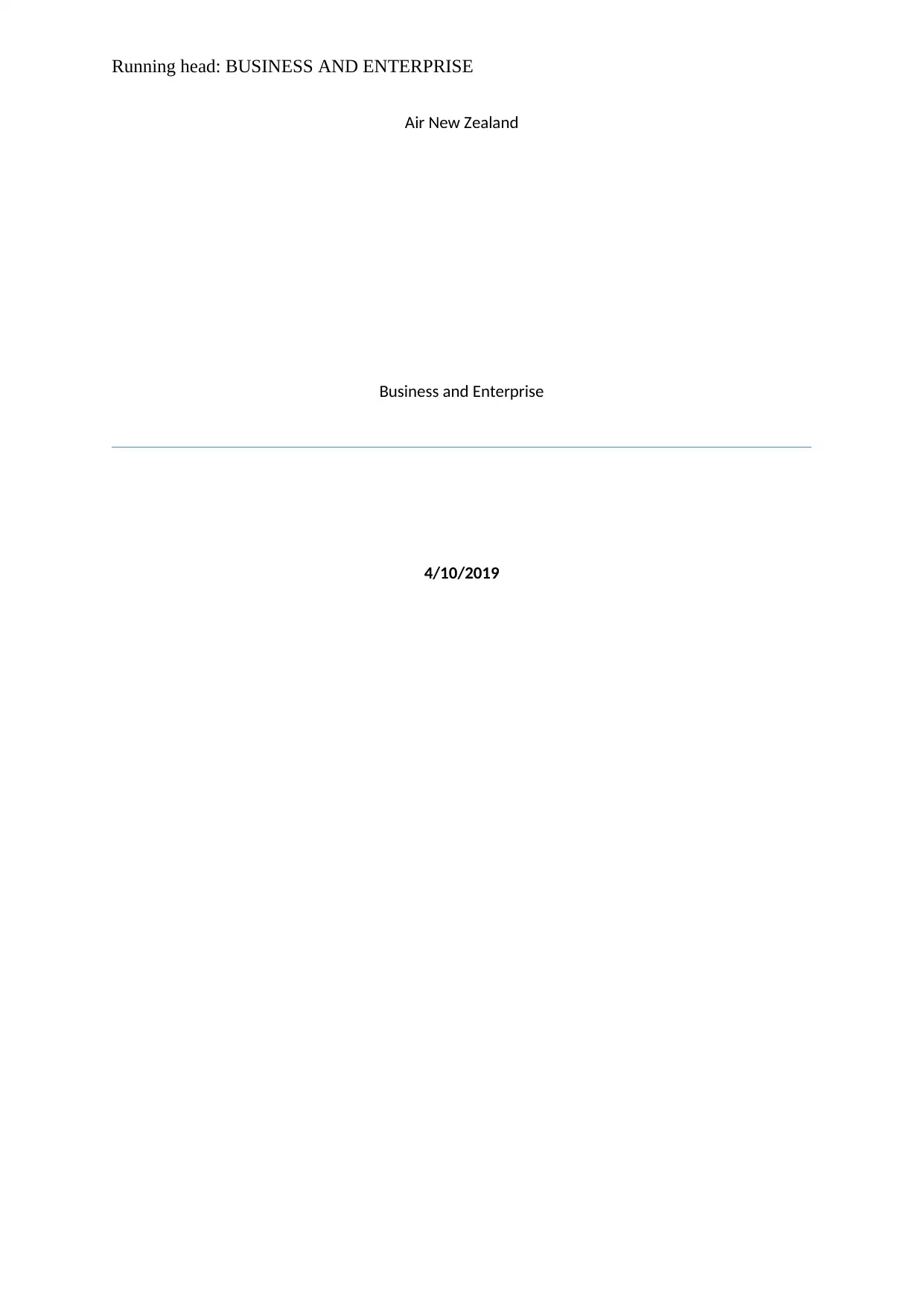
Running head: BUSINESS AND ENTERPRISE
Air New Zealand
Business and Enterprise
4/10/2019
Air New Zealand
Business and Enterprise
4/10/2019
Paraphrase This Document
Need a fresh take? Get an instant paraphrase of this document with our AI Paraphraser
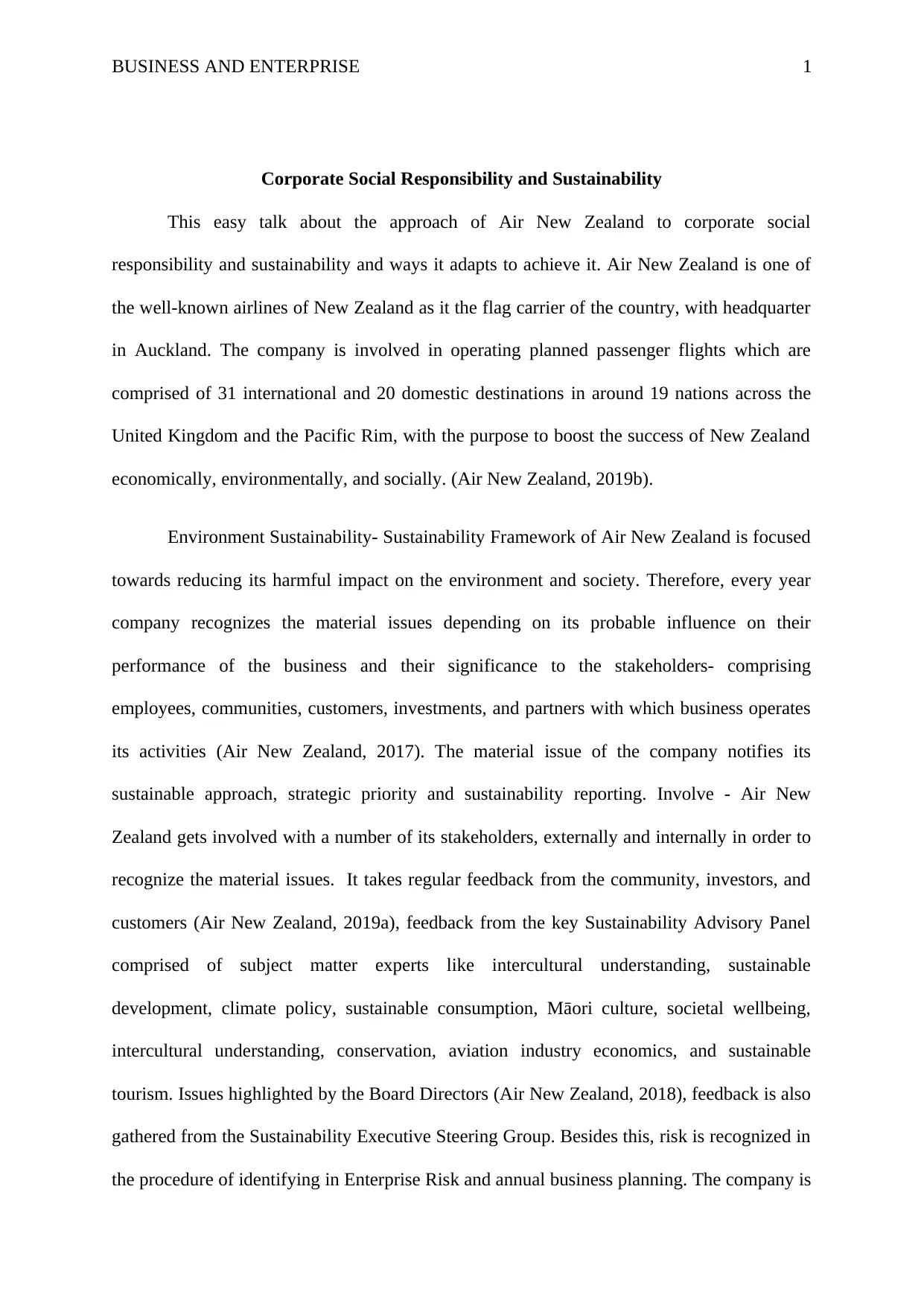
BUSINESS AND ENTERPRISE 1
Corporate Social Responsibility and Sustainability
This easy talk about the approach of Air New Zealand to corporate social
responsibility and sustainability and ways it adapts to achieve it. Air New Zealand is one of
the well-known airlines of New Zealand as it the flag carrier of the country, with headquarter
in Auckland. The company is involved in operating planned passenger flights which are
comprised of 31 international and 20 domestic destinations in around 19 nations across the
United Kingdom and the Pacific Rim, with the purpose to boost the success of New Zealand
economically, environmentally, and socially. (Air New Zealand, 2019b).
Environment Sustainability- Sustainability Framework of Air New Zealand is focused
towards reducing its harmful impact on the environment and society. Therefore, every year
company recognizes the material issues depending on its probable influence on their
performance of the business and their significance to the stakeholders- comprising
employees, communities, customers, investments, and partners with which business operates
its activities (Air New Zealand, 2017). The material issue of the company notifies its
sustainable approach, strategic priority and sustainability reporting. Involve - Air New
Zealand gets involved with a number of its stakeholders, externally and internally in order to
recognize the material issues. It takes regular feedback from the community, investors, and
customers (Air New Zealand, 2019a), feedback from the key Sustainability Advisory Panel
comprised of subject matter experts like intercultural understanding, sustainable
development, climate policy, sustainable consumption, Māori culture, societal wellbeing,
intercultural understanding, conservation, aviation industry economics, and sustainable
tourism. Issues highlighted by the Board Directors (Air New Zealand, 2018), feedback is also
gathered from the Sustainability Executive Steering Group. Besides this, risk is recognized in
the procedure of identifying in Enterprise Risk and annual business planning. The company is
Corporate Social Responsibility and Sustainability
This easy talk about the approach of Air New Zealand to corporate social
responsibility and sustainability and ways it adapts to achieve it. Air New Zealand is one of
the well-known airlines of New Zealand as it the flag carrier of the country, with headquarter
in Auckland. The company is involved in operating planned passenger flights which are
comprised of 31 international and 20 domestic destinations in around 19 nations across the
United Kingdom and the Pacific Rim, with the purpose to boost the success of New Zealand
economically, environmentally, and socially. (Air New Zealand, 2019b).
Environment Sustainability- Sustainability Framework of Air New Zealand is focused
towards reducing its harmful impact on the environment and society. Therefore, every year
company recognizes the material issues depending on its probable influence on their
performance of the business and their significance to the stakeholders- comprising
employees, communities, customers, investments, and partners with which business operates
its activities (Air New Zealand, 2017). The material issue of the company notifies its
sustainable approach, strategic priority and sustainability reporting. Involve - Air New
Zealand gets involved with a number of its stakeholders, externally and internally in order to
recognize the material issues. It takes regular feedback from the community, investors, and
customers (Air New Zealand, 2019a), feedback from the key Sustainability Advisory Panel
comprised of subject matter experts like intercultural understanding, sustainable
development, climate policy, sustainable consumption, Māori culture, societal wellbeing,
intercultural understanding, conservation, aviation industry economics, and sustainable
tourism. Issues highlighted by the Board Directors (Air New Zealand, 2018), feedback is also
gathered from the Sustainability Executive Steering Group. Besides this, risk is recognized in
the procedure of identifying in Enterprise Risk and annual business planning. The company is
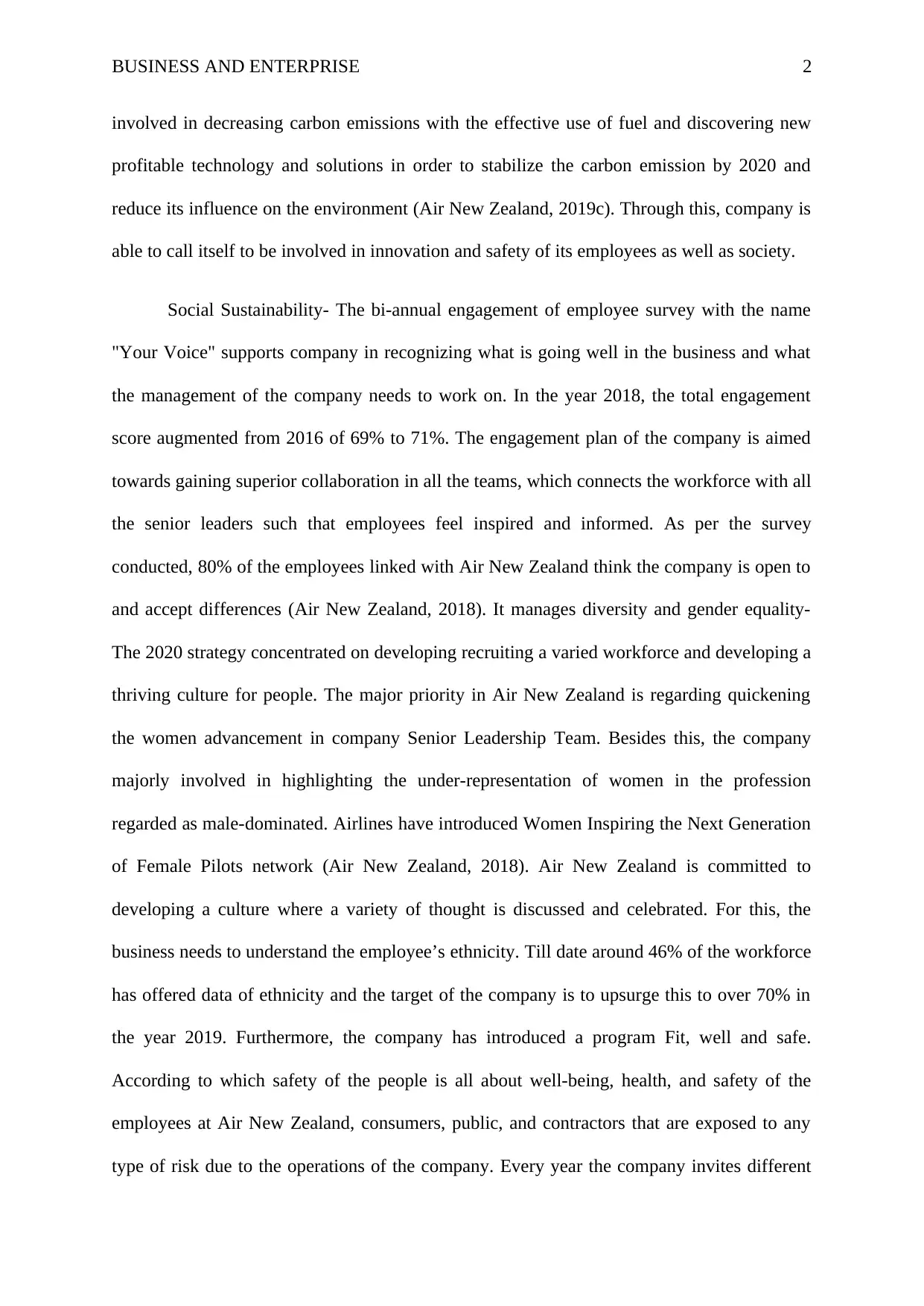
BUSINESS AND ENTERPRISE 2
involved in decreasing carbon emissions with the effective use of fuel and discovering new
profitable technology and solutions in order to stabilize the carbon emission by 2020 and
reduce its influence on the environment (Air New Zealand, 2019c). Through this, company is
able to call itself to be involved in innovation and safety of its employees as well as society.
Social Sustainability- The bi-annual engagement of employee survey with the name
"Your Voice" supports company in recognizing what is going well in the business and what
the management of the company needs to work on. In the year 2018, the total engagement
score augmented from 2016 of 69% to 71%. The engagement plan of the company is aimed
towards gaining superior collaboration in all the teams, which connects the workforce with all
the senior leaders such that employees feel inspired and informed. As per the survey
conducted, 80% of the employees linked with Air New Zealand think the company is open to
and accept differences (Air New Zealand, 2018). It manages diversity and gender equality-
The 2020 strategy concentrated on developing recruiting a varied workforce and developing a
thriving culture for people. The major priority in Air New Zealand is regarding quickening
the women advancement in company Senior Leadership Team. Besides this, the company
majorly involved in highlighting the under-representation of women in the profession
regarded as male-dominated. Airlines have introduced Women Inspiring the Next Generation
of Female Pilots network (Air New Zealand, 2018). Air New Zealand is committed to
developing a culture where a variety of thought is discussed and celebrated. For this, the
business needs to understand the employee’s ethnicity. Till date around 46% of the workforce
has offered data of ethnicity and the target of the company is to upsurge this to over 70% in
the year 2019. Furthermore, the company has introduced a program Fit, well and safe.
According to which safety of the people is all about well-being, health, and safety of the
employees at Air New Zealand, consumers, public, and contractors that are exposed to any
type of risk due to the operations of the company. Every year the company invites different
involved in decreasing carbon emissions with the effective use of fuel and discovering new
profitable technology and solutions in order to stabilize the carbon emission by 2020 and
reduce its influence on the environment (Air New Zealand, 2019c). Through this, company is
able to call itself to be involved in innovation and safety of its employees as well as society.
Social Sustainability- The bi-annual engagement of employee survey with the name
"Your Voice" supports company in recognizing what is going well in the business and what
the management of the company needs to work on. In the year 2018, the total engagement
score augmented from 2016 of 69% to 71%. The engagement plan of the company is aimed
towards gaining superior collaboration in all the teams, which connects the workforce with all
the senior leaders such that employees feel inspired and informed. As per the survey
conducted, 80% of the employees linked with Air New Zealand think the company is open to
and accept differences (Air New Zealand, 2018). It manages diversity and gender equality-
The 2020 strategy concentrated on developing recruiting a varied workforce and developing a
thriving culture for people. The major priority in Air New Zealand is regarding quickening
the women advancement in company Senior Leadership Team. Besides this, the company
majorly involved in highlighting the under-representation of women in the profession
regarded as male-dominated. Airlines have introduced Women Inspiring the Next Generation
of Female Pilots network (Air New Zealand, 2018). Air New Zealand is committed to
developing a culture where a variety of thought is discussed and celebrated. For this, the
business needs to understand the employee’s ethnicity. Till date around 46% of the workforce
has offered data of ethnicity and the target of the company is to upsurge this to over 70% in
the year 2019. Furthermore, the company has introduced a program Fit, well and safe.
According to which safety of the people is all about well-being, health, and safety of the
employees at Air New Zealand, consumers, public, and contractors that are exposed to any
type of risk due to the operations of the company. Every year the company invites different
⊘ This is a preview!⊘
Do you want full access?
Subscribe today to unlock all pages.

Trusted by 1+ million students worldwide
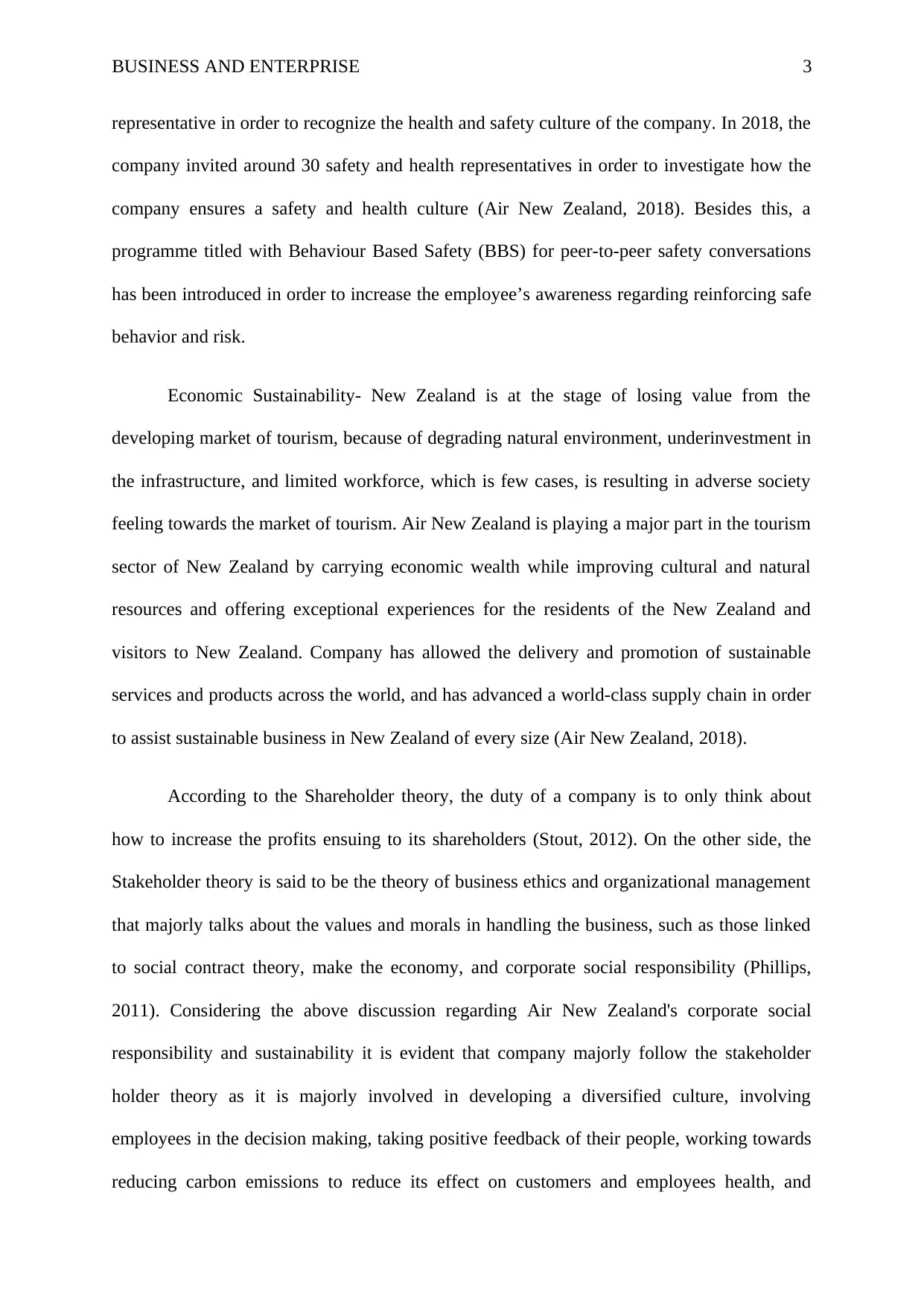
BUSINESS AND ENTERPRISE 3
representative in order to recognize the health and safety culture of the company. In 2018, the
company invited around 30 safety and health representatives in order to investigate how the
company ensures a safety and health culture (Air New Zealand, 2018). Besides this, a
programme titled with Behaviour Based Safety (BBS) for peer-to-peer safety conversations
has been introduced in order to increase the employee’s awareness regarding reinforcing safe
behavior and risk.
Economic Sustainability- New Zealand is at the stage of losing value from the
developing market of tourism, because of degrading natural environment, underinvestment in
the infrastructure, and limited workforce, which is few cases, is resulting in adverse society
feeling towards the market of tourism. Air New Zealand is playing a major part in the tourism
sector of New Zealand by carrying economic wealth while improving cultural and natural
resources and offering exceptional experiences for the residents of the New Zealand and
visitors to New Zealand. Company has allowed the delivery and promotion of sustainable
services and products across the world, and has advanced a world-class supply chain in order
to assist sustainable business in New Zealand of every size (Air New Zealand, 2018).
According to the Shareholder theory, the duty of a company is to only think about
how to increase the profits ensuing to its shareholders (Stout, 2012). On the other side, the
Stakeholder theory is said to be the theory of business ethics and organizational management
that majorly talks about the values and morals in handling the business, such as those linked
to social contract theory, make the economy, and corporate social responsibility (Phillips,
2011). Considering the above discussion regarding Air New Zealand's corporate social
responsibility and sustainability it is evident that company majorly follow the stakeholder
holder theory as it is majorly involved in developing a diversified culture, involving
employees in the decision making, taking positive feedback of their people, working towards
reducing carbon emissions to reduce its effect on customers and employees health, and
representative in order to recognize the health and safety culture of the company. In 2018, the
company invited around 30 safety and health representatives in order to investigate how the
company ensures a safety and health culture (Air New Zealand, 2018). Besides this, a
programme titled with Behaviour Based Safety (BBS) for peer-to-peer safety conversations
has been introduced in order to increase the employee’s awareness regarding reinforcing safe
behavior and risk.
Economic Sustainability- New Zealand is at the stage of losing value from the
developing market of tourism, because of degrading natural environment, underinvestment in
the infrastructure, and limited workforce, which is few cases, is resulting in adverse society
feeling towards the market of tourism. Air New Zealand is playing a major part in the tourism
sector of New Zealand by carrying economic wealth while improving cultural and natural
resources and offering exceptional experiences for the residents of the New Zealand and
visitors to New Zealand. Company has allowed the delivery and promotion of sustainable
services and products across the world, and has advanced a world-class supply chain in order
to assist sustainable business in New Zealand of every size (Air New Zealand, 2018).
According to the Shareholder theory, the duty of a company is to only think about
how to increase the profits ensuing to its shareholders (Stout, 2012). On the other side, the
Stakeholder theory is said to be the theory of business ethics and organizational management
that majorly talks about the values and morals in handling the business, such as those linked
to social contract theory, make the economy, and corporate social responsibility (Phillips,
2011). Considering the above discussion regarding Air New Zealand's corporate social
responsibility and sustainability it is evident that company majorly follow the stakeholder
holder theory as it is majorly involved in developing a diversified culture, involving
employees in the decision making, taking positive feedback of their people, working towards
reducing carbon emissions to reduce its effect on customers and employees health, and
Paraphrase This Document
Need a fresh take? Get an instant paraphrase of this document with our AI Paraphraser
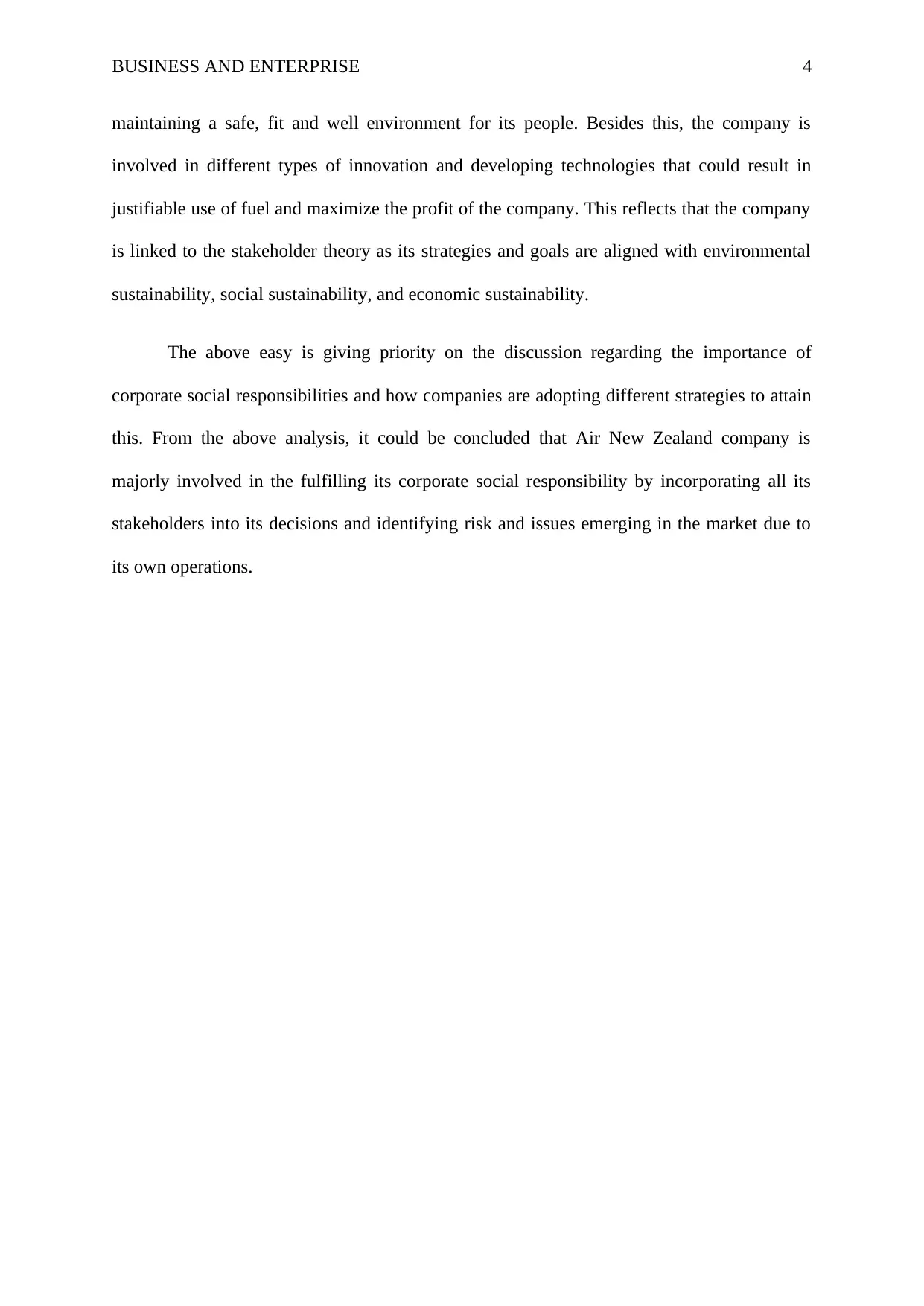
BUSINESS AND ENTERPRISE 4
maintaining a safe, fit and well environment for its people. Besides this, the company is
involved in different types of innovation and developing technologies that could result in
justifiable use of fuel and maximize the profit of the company. This reflects that the company
is linked to the stakeholder theory as its strategies and goals are aligned with environmental
sustainability, social sustainability, and economic sustainability.
The above easy is giving priority on the discussion regarding the importance of
corporate social responsibilities and how companies are adopting different strategies to attain
this. From the above analysis, it could be concluded that Air New Zealand company is
majorly involved in the fulfilling its corporate social responsibility by incorporating all its
stakeholders into its decisions and identifying risk and issues emerging in the market due to
its own operations.
maintaining a safe, fit and well environment for its people. Besides this, the company is
involved in different types of innovation and developing technologies that could result in
justifiable use of fuel and maximize the profit of the company. This reflects that the company
is linked to the stakeholder theory as its strategies and goals are aligned with environmental
sustainability, social sustainability, and economic sustainability.
The above easy is giving priority on the discussion regarding the importance of
corporate social responsibilities and how companies are adopting different strategies to attain
this. From the above analysis, it could be concluded that Air New Zealand company is
majorly involved in the fulfilling its corporate social responsibility by incorporating all its
stakeholders into its decisions and identifying risk and issues emerging in the market due to
its own operations.
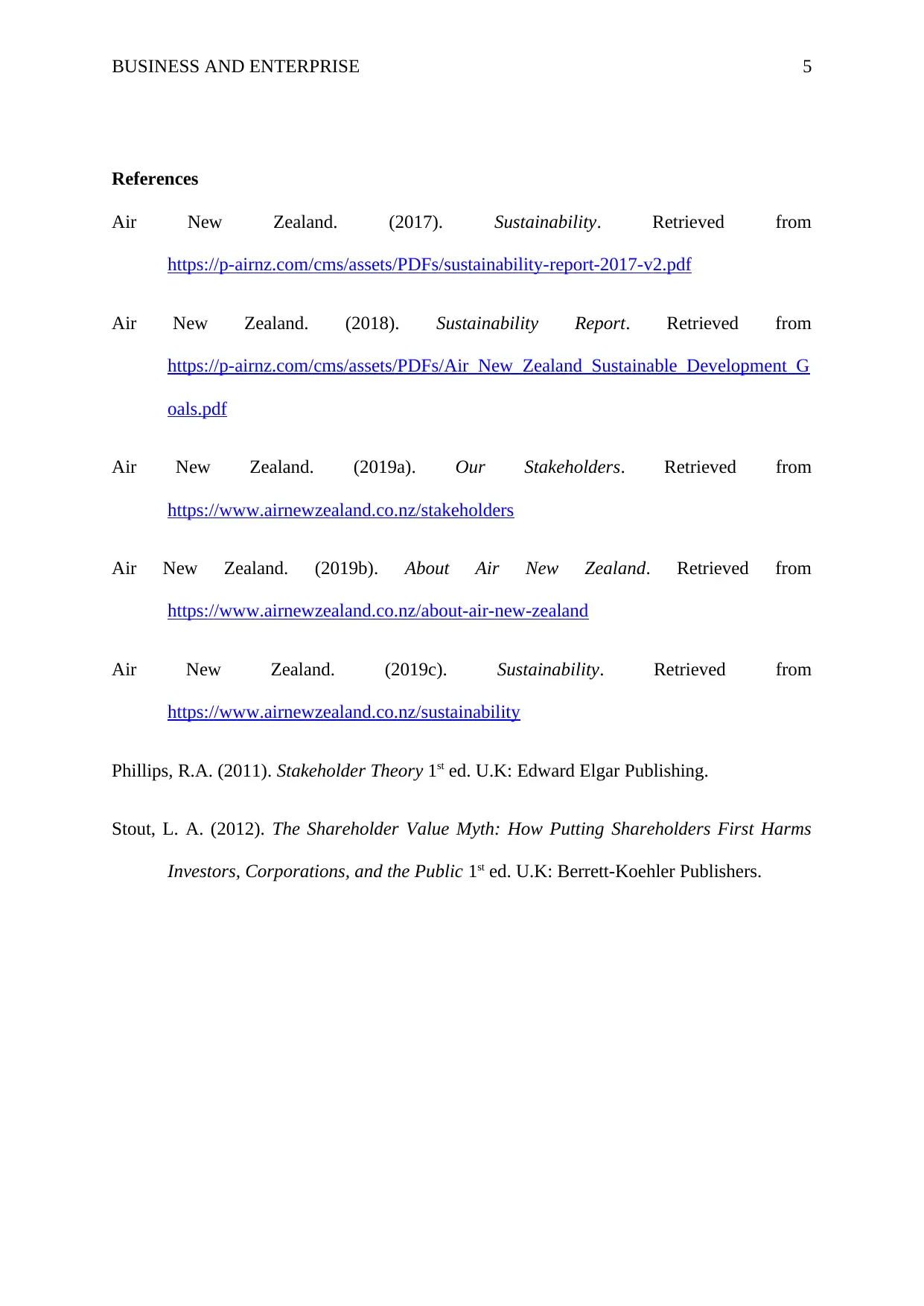
BUSINESS AND ENTERPRISE 5
References
Air New Zealand. (2017). Sustainability. Retrieved from
https://p-airnz.com/cms/assets/PDFs/sustainability-report-2017-v2.pdf
Air New Zealand. (2018). Sustainability Report. Retrieved from
https://p-airnz.com/cms/assets/PDFs/Air_New_Zealand_Sustainable_Development_G
oals.pdf
Air New Zealand. (2019a). Our Stakeholders. Retrieved from
https://www.airnewzealand.co.nz/stakeholders
Air New Zealand. (2019b). About Air New Zealand. Retrieved from
https://www.airnewzealand.co.nz/about-air-new-zealand
Air New Zealand. (2019c). Sustainability. Retrieved from
https://www.airnewzealand.co.nz/sustainability
Phillips, R.A. (2011). Stakeholder Theory 1st ed. U.K: Edward Elgar Publishing.
Stout, L. A. (2012). The Shareholder Value Myth: How Putting Shareholders First Harms
Investors, Corporations, and the Public 1st ed. U.K: Berrett-Koehler Publishers.
References
Air New Zealand. (2017). Sustainability. Retrieved from
https://p-airnz.com/cms/assets/PDFs/sustainability-report-2017-v2.pdf
Air New Zealand. (2018). Sustainability Report. Retrieved from
https://p-airnz.com/cms/assets/PDFs/Air_New_Zealand_Sustainable_Development_G
oals.pdf
Air New Zealand. (2019a). Our Stakeholders. Retrieved from
https://www.airnewzealand.co.nz/stakeholders
Air New Zealand. (2019b). About Air New Zealand. Retrieved from
https://www.airnewzealand.co.nz/about-air-new-zealand
Air New Zealand. (2019c). Sustainability. Retrieved from
https://www.airnewzealand.co.nz/sustainability
Phillips, R.A. (2011). Stakeholder Theory 1st ed. U.K: Edward Elgar Publishing.
Stout, L. A. (2012). The Shareholder Value Myth: How Putting Shareholders First Harms
Investors, Corporations, and the Public 1st ed. U.K: Berrett-Koehler Publishers.
⊘ This is a preview!⊘
Do you want full access?
Subscribe today to unlock all pages.

Trusted by 1+ million students worldwide
1 out of 6
Related Documents
Your All-in-One AI-Powered Toolkit for Academic Success.
+13062052269
info@desklib.com
Available 24*7 on WhatsApp / Email
![[object Object]](/_next/static/media/star-bottom.7253800d.svg)
Unlock your academic potential
Copyright © 2020–2026 A2Z Services. All Rights Reserved. Developed and managed by ZUCOL.




